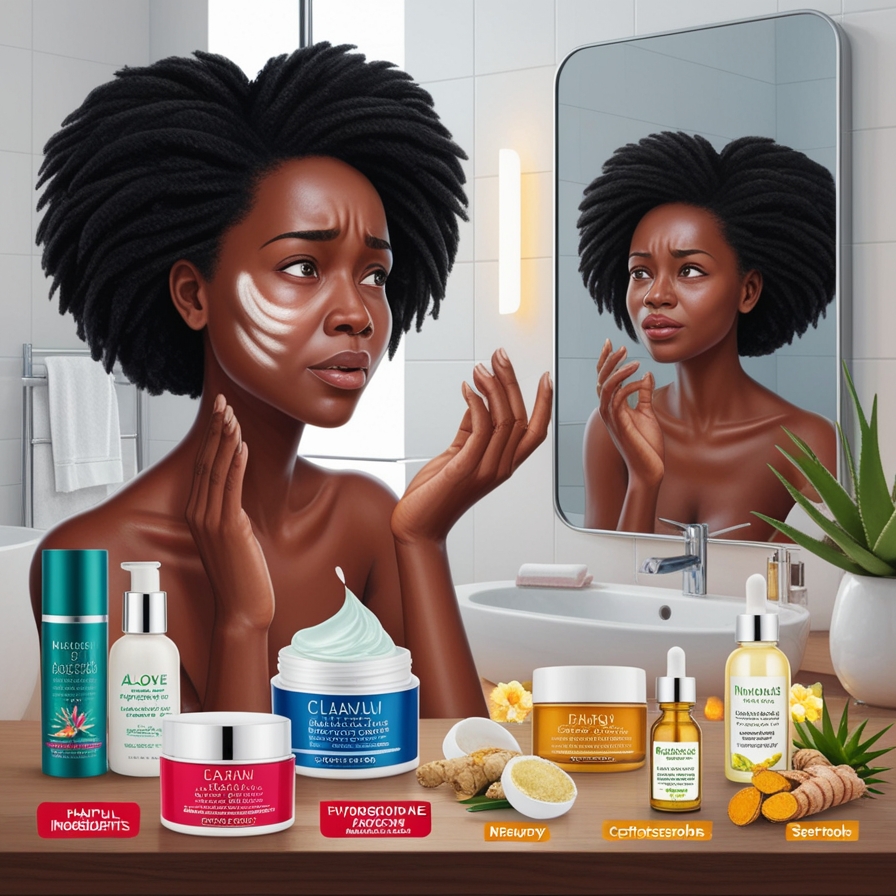In today’s beauty driven world, the quest for fairer skin has led many to use bleaching creams, often without knowing the hidden dangers they carry, while these products promise a lighter complexion, they come at a serious cost to your health, from toxic chemicals to irreversible skin damage, the risks are too significant to ignore, this article reveals the harsh reality of skin bleaching creams, the harmful ingredients lurking in them, and safe, natural alternatives for achieving a radiant glow without compromising your well-being.
The Health Effects of Bleaching Creams
1. Skin Damage
Uneven Skin Tone. Overuse of bleaching creams can cause skin discoloration and an unnatural, patchy look.
Thinning of the Skin. Some bleaching agents contain steroids that weaken the skin, making it more fragile and prone to infections.
Increased Sensitivity. Skin treated with bleaching creams becomes more vulnerable to sunburn, irritation, and allergic reactions.
2. Internal Health Risks
Mercury Poisoning. Some illegal or unregulated creams contain mercury, which can be absorbed through the skin, leading to kidney damage, neurological issues, and skin discoloration.
Steroid Complications. Long term use of corticosteroid-based creams can cause acne, stretch marks, and even hormonal imbalances.
Ochronosis (Skin Darkening) Hydroquinone, a common bleaching agent, can cause a condition called ochronosis, where the skin turns bluish black over time.
Liver and Kidney Damage. Harmful chemicals in bleaching creams can enter the bloodstream and affect major organs.
Harmful Ingredients in Bleaching Creams
When purchasing skin lightening products, always check the ingredient list to avoid harmful substances such as.
Mercury. Found in unregulated products, mercury is highly toxic and can lead to severe health problems.
Hydroquinone. While effective in treating hyperpigmentation, prolonged use can cause skin damage and ochronosis.
Corticosteroids. Common in prescription creams, these steroids can weaken the skin, making it more susceptible to infections and thinning.
Parabens & Artificial Fragrances. These chemicals can cause allergic reactions and disrupt hormones.
Safer Alternatives for a Brighter Skin Tone
Instead of using harsh bleaching creams, consider these natural and dermatologist approved methods for achieving a radiant complexion.
1. Natural Skin Brightening Agents
Vitamin C. Helps to fade dark spots and improve skin brightness.
Aloe Vera. Soothes and hydrates the skin while promoting an even tone.
Turmeric. Known for its anti inflammatory and skin brightening properties.
Licorice Extract. Reduces hyperpigmentation and prevents new dark spots from forming.
Papaya Enzymes. Naturally exfoliates and brightens the skin.
2. Healthy Skincare Habits
Use Sunscreen Daily. Prevents skin damage and dark spots caused by UV exposure.
Stay Hydrated. Drinking enough water keeps your skin healthy and glowing.
Eat a Balanced Diet. Foods rich in antioxidants, like berries and green vegetables, promote healthy skin.
Exfoliate Regularly. Helps remove dead skin cells, revealing brighter skin underneath.
3. Dermatologist Approved Treatments
If you want to achieve an even skin tone safely, consider professional treatments such as.
Chemical Peels. Helps remove dead skin cells and lighten pigmentation.
Laser Therapy. Targets dark spots and promotes even skin tone.
Microdermabrasion. Gently exfoliates the skin to reveal a fresh layer underneath.
Conclusion
While the desire for lighter skin is a personal choice, it is essential to make informed decisions about skincare products, many bleaching creams contain harmful ingredients that pose serious health risks, instead, go for natural skin brightening agents, maintain a healthy skincare routine, and seek professional treatments for safer results, beauty should never come at the cost of your health.

